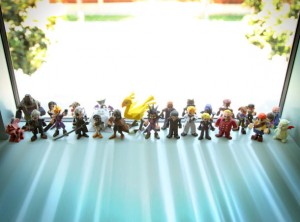Fans of video games, movies, and other forms of art love to own and create memorabilia. From figurines to fan fiction, it’s incredibly easy to make and share your tributes to your favorite characters or worlds. We’ve talked before about the many ways 3D printing has influence the world of collectibles. But we didn’t touch on the topic of copyright infringement.
Final Fantasy: 3D Edition

Image Credit Joaquin Baldwin
Shapeways user Joaquin Baldwin wanted to pay homage to one of his favorite videogames: Final Fantasy VII. So he created a series of 3D models based on the original pixelated graphics from the game, and put them up for sale. Because he used data from the games themselves, the figurines were perfect. His business exploded, and he started releasing even more figures, which fans eagerly snatched up.
That is, until Square Enix, the creators of the Final Fantasy series, requested that the figurines be taken off the site. Shapeways complied, and the models were taken down immediately.
The copyright issue here is pretty clear-cut. Square Enix owns the rights to Final Fantasy. Baldwin was making money of off them, if only enough to cover the time and energy he spent crafting the models.
Respecting Copyright
The question here is whether it’s okay to make and sell fan-made memorabilia. This issue is tricky, since it falls under the ever-ambiguous fair use law. Basically, if there is a way you can prove that your use of another person’s brand or imagery is fair use, you can continue to use it. However, whether or not something is fair use differs for each and every case.
3D printing will probably be approached in the same way as hand-made memorabilia. The popular crafting site Etsy has had to deal with this issue before – and their conclusion is just as ambiguous. Some artists care more about protecting their copyright than others. Other artists are selective about what they will and will not choose to prosecute.
In the end, you’ll need to consult a lawyer regarding whether or not your fan art falls under fair use laws, and whether you can sell it or even give that 3D model out for free. The best rule of thumb is that if you aren’t sure whether you are infringing, stay on the safe side, and ask for permission before you use someone else’s work.
